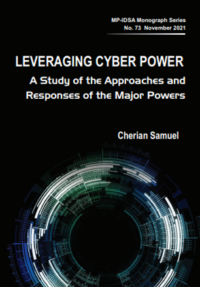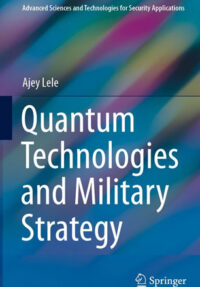Nuclear, Chemical and Biological Weapons (NCBW) in India & Pakistan Equation: Past & Present
Abstract: Relations between India and Pakistan have remained hostile, since partition, owing to varied geopolitical reasons. They both compete against each other in conventional and nuclear arms. While the threat of CBW remains low in the region, it cannot be completely ruled out. The existence of non-state actors also poses a credible threat to the inadvertent use of cheaply available chemical or biological weapons. It is therefore important to timely assess the past, present and future of NCBW between India and Pakistan.
Out of many factors that determine the stability of the South Asian region, nuclear, chemical and biological weapons dynamics play a major role in determining peace in the region. The reason for this stems out from the fact that the major players in the region, namely India and Pakistan, account for a sizable population. Both countries share one of the heaviest militarised borders in the world standing against each other all round the year irrespective of harsh terrain or extreme weather. Adding to that, turbulent past, domestic aspirations, alliances and new nexus have often fuelled competition amongst the major players in the region. Any chemical, biological or nuclear threat in the region will have disastrous consequences and its possible fallout is bound to have effects in its extended neighborhood due to geographical proximity.
The ongoing COVID crisis has alarmed the whole world about the disastrous consequences of a dangerous virus thus any risk pertaining to any Weapons of Mass Destruction must be taken with serious attention. South Asia is home to notorious non-state actors, particularly in the western part of South Asia. This not just poses a threat to the use of Nuclear, Chemical and Biological Weapons (NCBW), but also increases proliferation risks in the region. It is therefore essential to timely examine the past, present of NBC threats in the region.
Hostility and Race for Dominance
The rivalry between India and Pakistan dates back to the time of the bloody partition during 1947. As soon as the two countries grew, both developed their military capabilities partly through indigenous innovation as well as foreign assistance. While the military capabilities changed over time, so did the threat perceptions of each other. Territorial loss of East Pakistan in the 1971 war with India was a major setback that had a profound impact on military strategy in Pakistan for years.1 For India, the 1962 war with China blew prospects of peace in its northern borders. India undertook its first Peaceful Nuclear Explosion (PNE) in May 1974.2 Pakistan followed India’s suit and by the turn of the century, both India and Pakistan overtly came up as a Nuclear Weapons State (NWS). Since then, both countries continue to modernise their nuclear forces.
Post partition, both India and Pakistan became sufficiently equipped with the required infrastructure to develop chemical and biological weapons. Being ‘poor man’s choice of WMD’, they were not as complicated as nuclear weapons in terms of manufacturing and its delivery. There existed perpetual worry in the west regarding the potential manufacture and use of Chemical and Biological Weapons (CBW). There was a fear that in order to upscale dominance and asymmetry against each other, the countries in the region could explore CBW options at a viable cost. However, despite having potential infrastructure, the two major countries in the region chose to proscribe the CBWs by signing international treaties. Both at the same time kept nuclear options open by not signing the Nuclear Nonproliferation Treaty (NPT) and refrained from signing any international treaty that could bind them from further exploring nuclear weapons. In 1992, both India and Pakistan signed a joint declaration on banning the production or even use of any chemical weapons.3 In 1993, both countries signed the Chemical Weapons Convention (CWC) and ratified it in the following years. The two countries are also party to the Biological and Toxin Weapons Convention (BTWC). Notwithstanding adherence to international conventions and treaties banning the use of CBWs, both countries have accused each other of potentially developing such capabilities. Several assessments from the west have also deliberated such potential developments of CBW capabilities but none of the countries have confirmed any such reports.
A recent revelation by Klaxon Group alleges that Pakistan and China recently entered a covert agreement to expand bio-warfare capabilities.4 The report suggests that China’s interest in a secret deal lies in expanding the testing of biological agents outside its soil as well as keeping India engaged with Pakistan if needed. Central to this allegation is China’s infamous bio lab, Wuhan Institute of Virology. As per the report, the institute is responsible for providing logistical as well as financial support. Both China and Pakistan denied such allegations however, the report comes at a time when China is being held responsible by numerous countries for not appropriately handling the COVID-19 in its initial phases.
Developments and Trends in Chemical and Biological Weapons
At present, India and Pakistan have played active roles in international conventions related to Chemical and Biological Weapons. Biotech industries both in India and Pakistan have significantly developed over recent years with the establishment of new biotechnology institutions and pharmaceutical industries. Prominent institutions in Pakistan include the National Institute for Biotechnology and Genetic Engineering (NIBGE), Faisalabad, Nuclear Institute for Agriculture and Biology (NIAB) and Dr. A.Q. Khan Research Laboratories, Islamabad. India’s institutions include the National Institute of Immunology (NII), National Brain Research Centre (NBRC) and National Centre for Plant Genome Research (NCPGR), New Delhi.
Pakistan emphasises robust control on institutions and industries, analysts do note concern over the threat of accidental proliferation or use of dual-use technology by non-state actors. India too has a decent industrial and institutional base in both biotechnology and pharmaceuticals.
As far as Chemical Weapons are concerned, both India and Pakistan play an active role in the Organisation for the Prohibition of Chemical Weapons (OPCW) and adhere to periodic inspections. Adhering to the OPCW guidelines, India has completely dismantled its chemical weapons program.5 While the major players in the region have officially adhered to not use CBW’s, several nuclear doctrines like that of India considers the use of CBW as crossing the nuclear threshold. In 2003, India revised its nuclear doctrine and added that the use of CBW against India will give it a right to use nuclear weapons.6 This not just added a deterrent against the use of CBW’s but has linked CBW security to nuclear security in the region.
Conclusion
The use of CBW’s offer lesser incentives and more risks. While the risk of CBW lies between low to moderate, risks of nuclear weapons have never been low. South Asia has been the fastest- growing nuclear weapons region. Pakistan at present has heavily invested in nuclear weapons.
As compared to the other forms of WMD, the threat of CBWs in the region remains relatively very less. While there exist enough infrastructural capabilities for the development of CBWs, there is less evidence to suggest a concrete threat of CBW. Heavy population density and geographic proximity to each other offer less incentive for a country to pursue an offensive chemical or biological weapons program. The possible use can have disastrous fall out impacting all equally. Major stakeholders in the region are party to various international treaties and conventions, making them bound to abide by international guidelines. While the use of CBWs doesn’t fit into the strategic paradigm of any rational actors in the international system. Yet the threat of notorious use by non-state actors should not be ruled out. In order to prevent any inadvertent use, periodic inspections, commitments to the spirit of international treaties and international guidelines for physical safety is a must.
- 1. Hafeez, Qura, Qura Hafeez, and prof. Hadzidedic. 2020. "How the 1971 War Brought Pakistan Closer To Nuclear Bomb". Modern Diplomacy. Accessed October 12. https://moderndiplomacy.eu/2018/12/17/how-1971-war-brought-pakistan-closer-to-nuclear-bomb/
- 2. Diplomat, The. 2020. "History’S Hostage: China, India And The War Of 1962". Thediplomat.Com. https://thediplomat.com/2012/08/historys-hostage-china-india-and-the-war-of-1962/
- 3. "Chemical Weapons - India Nuclear Forces". 2020. Fas.Org. Accessed October 12. https://fas.org/nuke/guide/india/cw/
- 4. "EXCLUSIVE: China's Wuhan Lab Operating “Covert Operations” In Pakistan, Handling "Anthrax-Like" Pathogens — The Klaxon". 2020. The Klaxon. (The Klaxon is an investigative newspaper based in Australia) https://www.theklaxon.com.au/home/xdx17f6auh0tew0g57ubqrzxkdeux9.
- 5. "India Completes Chemical Weapons Disposal; Iraq Declares Stockpile | Analysis | NTI". 2020. Nti.Org. Accessed October 12. https://www.nti.org/gsn/article/india-completes-chemical-weapons-disposal-iraq-declares-stockpile/
- 6. https://www.mea.gov.in/press-releases.htm?dtl/20131/The+Cabinet+Committe...
- Ankit Kumar
- July-December 2020












